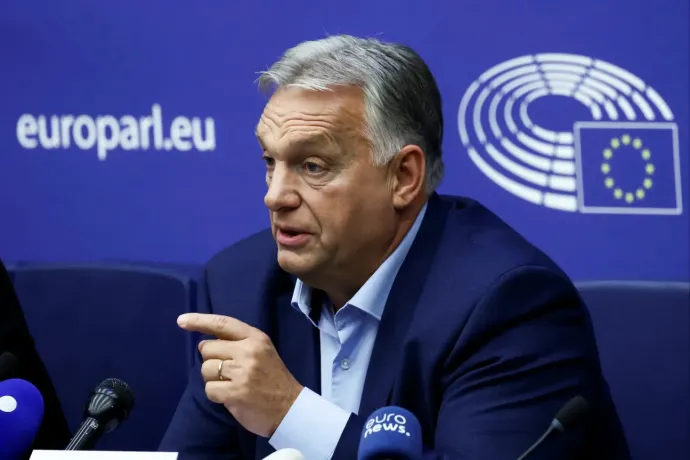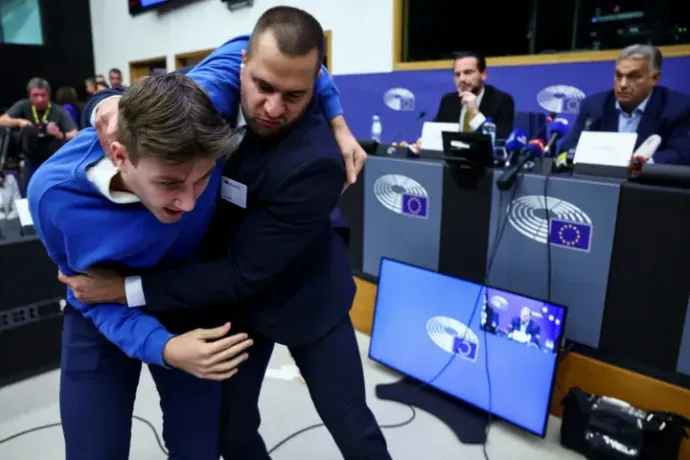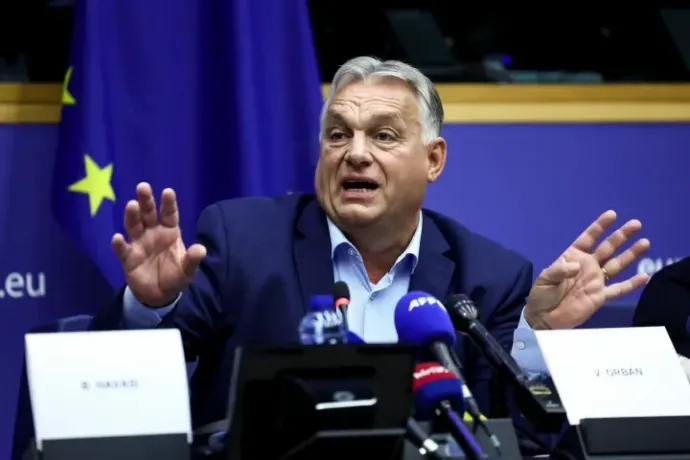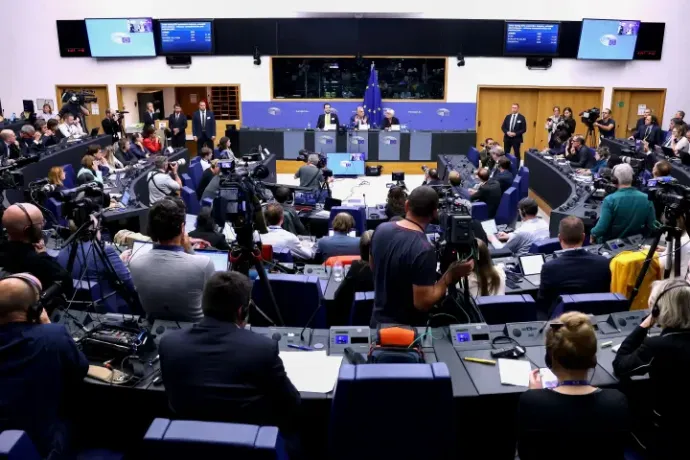"How much did you betray your homeland for, Prime Minister?" – Orbán's press conference at EP interrupted

Tomorrow's huffing and puffing might divert attention from the essence of the presidency's programme, so we wanted to present it separately too, Hungarian Prime Minister Viktor Orbán began his press conference on Hungary's Council presidency at the European Parliament building in Strasbourg on Tuesday. The press conference preceded Orbán's addressing the plenary session of the EP on Wednesday morning in his capacity as President-in-Office of the Council of the European Union.
The first Hungarian presidency, in 2011, was also at a time of crisis, he said of the position each member state gets to hold every 13.5 years (counting current member states), and said that he has already marked the third one in his calendar. Orbán said the situation is much worse now than before, given the war raging in Ukraine and the serious conflicts going on in the Middle East and Africa.
Not long after it began, the press conference was interrupted by a man throwing notes, asking "How much did you betray your homeland for, Prime Minister?"
"Hungarian is a direct language, and communication is fairly rough. When one politician calls another a villain, in our culture it means I disagree with you," Orbán reacted after the protester who barged into the press conference was removed.
According to a statement from DK (Demokratikus Koalíció), the protester was Márton Gyekiczki, a local government representative of theirs. According to the party, the young MP is the same one who threw play money at Viktor Orbán at the Kötcse picnic in early September, telling him to trade with it instead of the country. At the EP in Strasbourg it wasn't the EP's security, but Orbán's bodyguards who tackled him.

Orbán's proposal: holding summits on Schengen
We want to be catalysts of change, Orbán said of the Hungarian presidency's goals to boost EU competitiveness. The EU's economy is slower than that of China or even the US. For example, we have to pay two to three times more for energy compared to the US, and on top of that we have unfavourable demographic trends, which even migration cannot make up for, he said. Citing Mario Draghi's recent report, he warned that Europe could be in for a "slow agony". This is why adopting a package on competitiveness at the informal EU summit in Budapest in November is one of the Hungarian presidency’s goals. One of the foundations of this package would be connectivity (which is ideologically important for the Hungarian government). He later elaborated that the Draghi report is based on pursuing our own European interest, which provides a good basis.
He had a peculiar interpretation of the member states’ recent vote on the protective tariffs on Chinese cars. Although only five members voted against the Commission's proposal, he added the 12 abstentions to this as well, saying they did not agree with it either. (In fact, abstention implies that they did not oppose the Commission's proposal on safeguard tariffs, which is why the body likely said it had the majority needed to impose them.)
"The only migrants who won't stay here are the ones we don't allow in" and they should only be allowed in with a permit, Orbán said. He said that applications should be processed outside the EU's borders, and added that when he had first suggested this, he was called an idiot or evil, when what was needed were external hotspots. He said the EU's immigration system is not working, which is why homophobia and anti-Semitism are on the rise and why it is destroying the Schengen area.
Because of the latter, he suggests introducing meetings between Schengen countries at the level of Heads of State and Government, similar to the Euro area summits.
With regard to enlargement policy, Orbán said that Europe would never be complete without the integration of the Balkans. "It’s been twenty years since we promised the countries of the Western Balkans that we would admit them. It is high time we delivered on that promise", which is why he is also initiating a summit between the EU and the Western Balkans. "No enlargement will be successful without Serbia", and anyone who thinks that the other Western Balkan countries can be integrated without Serbia is "chasing illusions", according to him.
He said that they also started to map out the direction of the agricultural policy for the next seven-year budget beyond 2027, where he would like to see a farmer-friendly system.
This is the "essence" of the presidency, this is our presidency programme: "Let's make Europe great again", he said, citing the presidency's slogan, which rhymes with Donald Trump's campaign slogan. In response to a journalist's question shortly afterwards, he said that he would pop open a bottle of champagne if Trump returned, and said that this is why he is especially pleased that the informal summit in Budapest would be held on 7 November, two days after the US presidential election.
A ring of protests around the European elite
"For the past two years, Hungary has been slowing down the EU's negotiations on Ukraine in the area of financial and military aid," a Ukrainian journalist began, noting that the EU is discussing a €35 billion loan next week. Orbán has already opposed the aid, and the journalist asked him why he was doing this. "If you don't help Ukraine," Ukraine will fall and Russian forces will be near the Hungarian border, the journalist said. “Will you then go to war against Russia or will you say “Welcome, Vladimir?”
The Hungarian Presidency does not include attacking Russia, there is no talk of preparing for this. It seems absurd, as Hungary is a member of NATO, and NATO is far stronger than Ukraine, he said, adding that if Russia is having a hard time with Ukraine, what would Russia do with NATO? "We are safe", Orbán said, noting that his government had spent huge amounts of money from Hungarian budgetary resources on a humanitarian programme to help Ukrainian refugees. "We have done everything a Christian country should do for its neighbour". Orbán said, admitting that his position differs from that of the majority of the EU. “If you simply can't win this war on the battlefield, then you have to negotiate and save human lives, and I am convinced that it cannot be decided on the battlefield, so the strategy the EU is following is not the right strategy.”
Although victory is a legitimate goal for Ukraine, Orbán believes it cannot be achieved on the battlefield. "A war cannot be managed without communication." According to the Hungarian PM, what is happening is irrational, and he personally is in favour of communication, even though he does not know how the conflict itself should be resolved.
“All we would like to do is to convince the EU leaders that a new strategy is needed, because the current strategy is not working, that's the bottom line.”
There could be a ring of protests forming around the European elite, "I understand that everyone is on edge", but changing course is a part of democracy, and calm is needed. The Patriots for Europe (PfE) group, one of the founders of which is Fidesz shouldn't be excluded, but included. In his view, it is inconceivable for the opposition not to be given committee chairmanships in the Hungarian parliament.
Orbán was asked what it was that he wanted to change, given that so far they have supported 95 percent of EU legislation. He said there should be dialogue, but the "huge blow" of migration in 2015 and Brexit changed that. Now they have to pay €200 million and an additional million euros a day for "not allowing migrants in" (a fine imposed by the European Court of Justice back in June because the government failed to comply with EU asylum rules). Orbán said that Brexit had upset the balance between the more federalist and the more centrist parties. "Can you imagine the conditionality mechanism with the British?" – Orbán asked, even though the pro-Brexit campaigners had campaigned, among other things, on the issue of contributions.

"Unity is the most important EU issue," Orbán replied, recalling that the EU's motto is "unity in diversity."
"This does not mean that I, as the Hungarian prime minister, have to keep my mouth shut all the time."
Orbán argued that he represents interests on a national basis and is seeking compromise with those who represent their own interests. "I don't represent a globalist elite. (...) Here I am, with two feet on the ground, representing national interests, ready to come to a compromise with those who represent their own national interests." Orbán said that this is the way it should be, so the task is to agree “on how we can work together, that's what European politics is all about.”
The Vox loan and the Budapest-Belgrade railway
I do politics, it's not my place to deal with business issues, he said, trying to deflect a question about the MBH loan to PfE's Vox. He said that in some countries one has to campaign on borrowed money and some parties aren't given loans. "Is that fair"? In Hungary, on the other hand, he said, it is clear how much money can be spent, and there is a clear and strict legal framework for campaigning with state support.
I don't want to talk about private investments," he replied later, when asked about his father's role in the renovation of the Budapest-Belgrade railway line. It was in mid-September that referring to internal documents they had seen and transport companies they had spoken with, 444.hu reported that there were construction materials delivered from the quarry of the Orbán family for the renovation of the Budapest-Belgrade railway line, meaning that in addition to the PM's friend Lőrinc Mészáros, Viktor Orbán's immediate family members could also be benefiting from the massive state construction project.
When asked about the "peace mission", he said he had sent written a report to the EU institutions within 48 hours, followed by a summary of what should be done. Both sides are firmly convinced that time is on their side, whereas Europe's interest is in a ceasefire, so the warring parties should be persuaded to communicate, he said, adding that more and more countries should be persuaded to open channels of communication.
"We are now finally discussing peace," Orbán said, claiming that this was the result of his peace mission, and not Russia's failure to achieve its military objectives against Ukraine, which was partly due to the fact that Ukraine had received Western arms supplies to help defend itself against the aggressor.
“Fighting is in our blood, we will be first in line if our country needs to be defended”
I'm not an icon, I had no such ambition, I'm a simple country guy, not an international guy. The only reason I became famous – even in a negative sense – is because the liberals made me famous, he said. All I am doing is serving Hungary, he said in response to a question from a Dutch journalist. He described Geert Wilders, the leader of the Dutch Freedom Party, which recently won a parliamentary election and is also a PfE member, as a brave man.
"My party is a party of freedom fighters. Fighting is in our blood, if we have to defend the country, we will be first in line," he said. “On the other hand, we have had our share of experience with the Russians. We've been invaded several times, so it wouldn't be a new thing for us. We also know when to negotiate and when not to negotiate, we know exactly what we are talking about.”
"We sympathize with our Ukrainian friends in this very difficult situation.
It is not easy for the poor Ukrainians to pursue the right policies and achieve good results in such a complicated situation," he said with unusual compassion. When answering a theoretical question about Hungary outside NATO, however, Orbán said there was no point to this, because “Hungary is a member of NATO, so there is no need to think about what would happen if it were not. Thank God we are in, we spent decades as a buffer zone. That was not easy, but we survived and we are now in NATO. It took us more than forty years, but we did it, it didn't happen overnight. We endured and found NATO's haven of peace.”
He then turned to Poland, where his "political friends" are suffering a lot. He explained that they had a very good, modern friendship with the previous government, but this has been "killed" by the new leadership. He also said that it was impossible to isolate someone in the EU, and although it had been previously attempted with the Austrians, the Austrian Freedom Party (FPÖ) then won last Sunday's elections. They have a strong voice on migration, for example, he said, describing the Austrian far-right party as one having a political, rather than a bureaucratic, approach to the presidency.
He said that they fear strong leaders in Brussels, but they are the ones needed in a time of crisis. "Believe me, they will fail, as I have failed before," he said, laughing. It's very hard to show strong leadership with a fragile background and the need to survive the next minute, you need a big majority at home, he said, advising European governments.
By definition, the European Parliament is a political body and it is the one that initiated the Article 7 procedure, he said when asked about the EP's new Dutch rapporteur in charge of the case. The European Commission has never initiated such a procedure. (He did not add that the EU's quasi-government froze funding due to concerns over the rule of law and initiated the conditionality procedure, which was approved by the vast majority of member states.)
"What will it take for you to change your confrontational stance with the EU?" – a journalist for the Austrian public television asked.
"I think we have a friendly approach toward the EU."
– Orbán said, repeating an earlier answer according to which there are politicians who believe that in the name of unity, national representatives should keep their mouths shut and that there are also those who believe that if one is to represent national interests, compromises should be made. Orbán defines himself as the latter type. "Europe is not in Strasbourg or Brussels, but in Rome, Paris, Vienna, Budapest", i.e. it's a community of nation states, not a federalist community. He said that the relationship between the EU and the Hungarian government "is not one of hostility or confrontation", but of business as usual, it's the normal, everyday attitude, he said.
“There will be no refugee camp in Vitnyéd”
It would be best to reach an agreement and that is what we intend to do, and there have been good examples of this, he said when asked whether the loss of more than €1 billion could be avoided by mid-December. This would be due to the conditionality procedure, which was adopted almost unanimously by member states. The procedure has banned Hungarian public interest trusts, including model-switching universities with such a background, from entering into commitments with EU programmes. This is causing problems for the Erasmus educational exchanges – which students of the institutions concerned can no longer take part in – and the Horizon Europe research programme – regarding which there were already complaints last summer about millions of euros in losses – but Orbán said there was a back-up plan.
They have set up their own system and "we love it", he said, referring to the Pannónia and HU-rizont programmes, even though participation in the latter has so far been way below expectations. He admitted that these are of course covered from the state budget, but said that this is a sensible expense and that withholding the money is "blackmail". (He did not mention that the government has admittedly not accepted all the conditions of the European Commission and is effectively trying to have foundations which do not receive EU funding, and which are not behind universities, such as MCC be exempt from a large part of the restrictions.)
A Bulgarian journalist asked how Hungary, as the holder of the rotating EU presidency approaches the accession of Bulgaria and Romania to Schengen, which is still pending. "We are always bringing up the question, and the decision is not far. There is only one country that is still against it, but the decision needs to be unanimous," he said, without naming Austria. "I will do my best to let Bulgarians and Romanians into Schengen. Because this is a huge advantage for the EU, and they are ready to defend the external borders of the EU." "Does it make sense to have a Schengen border between Hungary and Romania? No," Orbán said, pledging his support for the two countries.
"It's not that far away," he said when asked whether the Hungarian government would transport migrants to Brussels, although he added that EU rules would be respected.

Telex asked whether there was a draft government decision to set up a refugee camp in Vitnyéd. The government has repeatedly denied it, but Magyar Hang claims to have obtained a previous Interior Ministry proposal to build a refugee camp in Vitnyéd for five billion forints.
According to the newspaper, the text justified the plan by the government's desire to comply with a ruling by the EU Court of Justice several years ago and thus stop the one million euro a day fine from continuing to grow. The government has admitted that they have been negotiating with the goal of avoiding this, but "if there is no refugee camp, then how do we plan to comply with the judgment?"
"You hit the nail right on the head, that's the crux of the problem. There will be no refugee camp in Vitnyéd and no migrant camp anywhere," Orbán said in response.
He noted that "there is a problem", because the new EU rules require Hungary to "create accommodation for thousands, perhaps about eight thousand migrants." "Only we and the Italians were given this number, while Hungary has zero migrants." Orbán said that "there will always be a bit of a cacophony, some say we will build, others say we won't build" any migrant camps, but he finally reiterated that no such facility will be built in Hungary.
Huffing and puffing expected on Wednesday
Orbán arrived in Strasbourg on Tuesday and announced his plan in a Facebook post, saying "We will present our programme, we want to sound a wake-up call in the European Parliament". “Europe is in serious trouble because of migration and the economic situation.
We will present the programme and then there will be a little pushing and shoving, some huffing and puffing, as is the norm.”
As previously reported, the rotating six-monthly presidency of the Council of Ministers is traditionally presented to the EP by the leader of the member state in question. Hungary took over the baton on 1 July.
A few weeks later, there was a monthly plenary session scheduled where the Hungarian Prime Minister could, in principle, have spoken. But the EP had just been reconstituted after the European elections on 9 June, and as Szabad Európa reported, he would only have been able to speak on a day that did not suit him. The Liberals, however, claimed that the real reason was the Prime Pinister's "peace mission", accompanied by Facebook posts endowed with the presidency logo and ambiguous statements a few days after the start of Hungary's Council presidency (This move not only angered the majority of the EP, which is a regular critic of the Hungarian government, but also riled up the vast majority of member state governments).
Following the August break, the debate was already on the agenda for September's plenary session, but Orbán cancelled it two days before the planned date, after Péter Magyar, leader of the Tisza Party, had asked him to postpone it due to the flooding on the Danube.
Orbán used to be a regular guest in Strasbourg for years but has not visited the EP for a long time. He even spoke up in defense of the Hungarian rule of law situation at the plenary sessions in 2018. In January 2019, however, ahead of the next such debate, Péter Szijjártó, Minister of Foreign Affairs and Trade, said that they would not participate in the body's theatrics. The Hungarian Prime Minister did speak in the EP building in April this year, but in Brussels, at the meeting of a political group.
Manfred Weber, the leader of the EPP has confirmed that he would be speaking on behalf of the group on Wednesday first, and he would be followed by Péter Magyar in the second round. Italy's Ilaria Salis also said she would be speaking.
If you want to make sure not to miss quick, accurate and impartial news from Hungary in the future, subscribe to the Telex English newsletter!